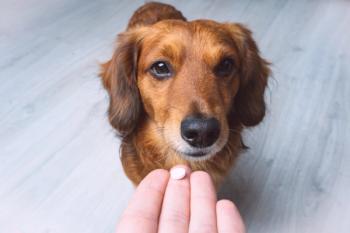
I'm a veterinary hypocrite; are you one too?
We eat a lot of crow when we do the things we deplore.
Between the crab cake and the chocolate mousse at a recent CE dinner I attended, I heard an orthopedist across the table utter the word "steroids." I looked up immediately (and not just because I was out of crab cakes). As a "new-school" veterinarian brought up in the age of NSAIDs, the subject of steroids in orthopedic cases always gets my attention.
The orthopedist related how as a resident years ago he balked at using steroids. His team now uses them with such frequency that the drugs have a nickname: the "special sauce." I saw looks of horror flash across the faces of most veterinarians under the age of 35, and nods of approval from our more senior colleagues.
As I listened to his experience with the "special sauce" and observed the reactions around the table, I felt my brow furrow critically—and then I stopped myself. I reflected on how many times I've judged other veterinarians for their chosen course of action. I also thought about how many times I've said, "I'll never do X ... " and then done just that.
I thought back to the first time I used steroids on a limping dog. It hadn't been my choice. The practice owner had come into the exam room with me because the client was a longtime friend of his. He guided the conversation to a steroid injection, and the owner decided that's what he wanted.
On more than one occasion I had mentally (and even verbally) ripped doctors who had chosen this treatment. Yet here I was committing the very Vetalog sin I'd derided others for so many times.
I'm relieved to report that the patient survived the injection and stopped limping after about 10 minutes. The client was thrilled, and the lameness did not recur. My boss slapped me on the back and said, "I told you so."
Since then I've employed steroids from time to time when a situation dictated the need. But you know what else I've done? I've rolled my eyes at the medical records of others who have done the same.
I would never do that!
Thus is the nature of veterinary hypocrisy. We do what we need to do in the circumstances we face. We then conveniently forget what we've done and pass judgment on our peers when their similar cases appear before us. We often do this with minimal knowledge of the circumstances the other practitioner was facing.
I remember working an emergency shift a few years ago when a patient presented from a referral hospital. Shortly after arrival, the patient's deteriorated. My colleague asked the owner if we could repeat some of the diagnostics that the referring veterinarian had done. The owner agreed.
The next morning, the referring veterinarian called in a rage. He believed we'd implied to the client that his tests "weren't good enough." I don't know if he ever believed our version of the story, but I remember feeling insulted and telling our team that we would never treat other veterinarians that way.
Two years later I arrived at work to a swarm of agitated technicians. They informed me that a client I had referred to a specialty hospital for an abdominal ultrasound had called and was angry. They said the specialty practice wanted to charge him emergency fees and admit his pet for care prior to performing the ultrasound. My team also (rather easily, I admit) planted the idea in my mind that my client, who trusted me, was being gouged. I was furious. I called the referral hospital and let the attending veterinarian know that I would not stand for this!
After venting at the attending veterinarian, who swore she didn't know why the patient was at the hospital if not for immediate treatment of vomiting, I hung up the phone. I turned to my impromptu anger support group and asked, "Liz did call and confirm that ultrasound appointment with radiology yesterday, right?" I was met with silence. Oops.
Fifteen minutes later I had the attending veterinarian back on the line: "I just want to apologize." I went on to grovel for quite some time.
I had done exactly what I swore I wouldn't: I had jumped to an inaccurate conclusion about why another doctor had made the choices she did, what the circumstances were and what she had said to the pet owner. I was a hypocrite, and it definitely wasn't the first time. Or the last, probably.
My résumé of taking certain actions I swore I never would (and harshly judging other veterinarians who did) is extensive. It includes numerous concessions to client demands, diagnostic testing waivers, decisions to refer cases, decisions not to refer cases, freestyle diet modifications ("Just add some green beans") and so on. Needless to say, it's not a short list. I'm willing to bet that if you've been in practice a few years, yours isn't short either.
I should be doing this
Every year we find ourselves in situations we wouldn't have imagined the year before. No one has all the answers, and none of us works without financial and medical limitations. Hypocrisy ends when we remember that about others as well as ourselves. Recognizing our own hypocrisy helps us improve our profession by making it more forgiving and less judgmental.
Let's pledge as professionals to minimize that behavior as much as possible. I'll start with me.
Dr. Andy Roark practices in ljamsville, Md. He's also the founder of veterinary consulting firm Tall Oaks Enterprises. Follow him on Facebook or @DrAndyRoark on Twitter.
Newsletter
From exam room tips to practice management insights, get trusted veterinary news delivered straight to your inbox—subscribe to dvm360.






